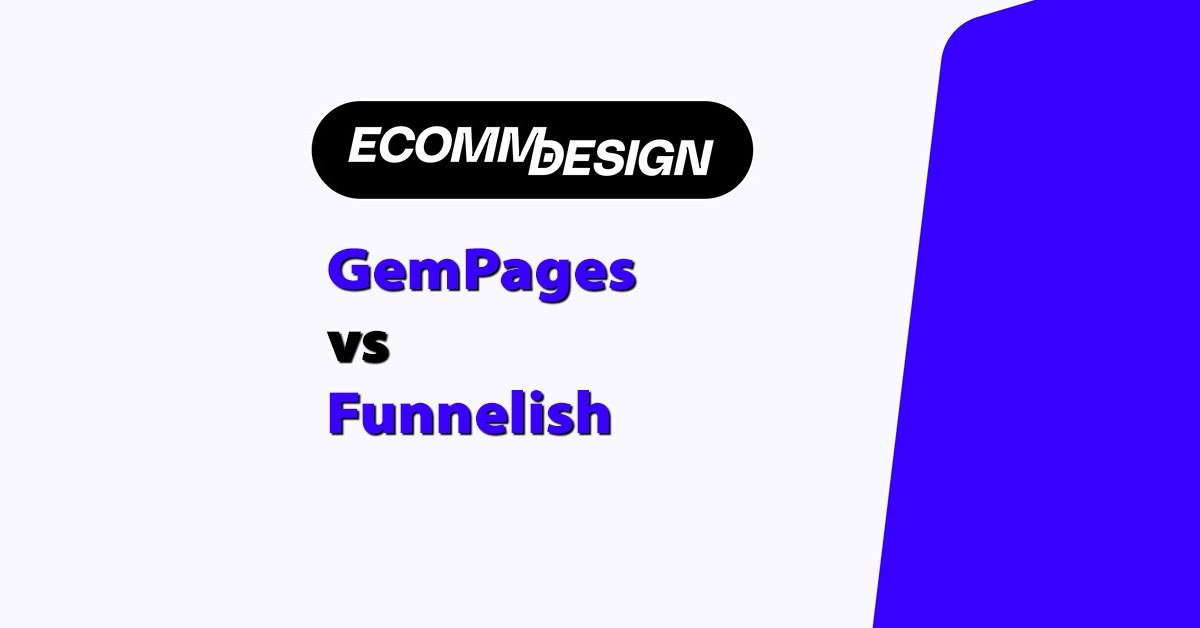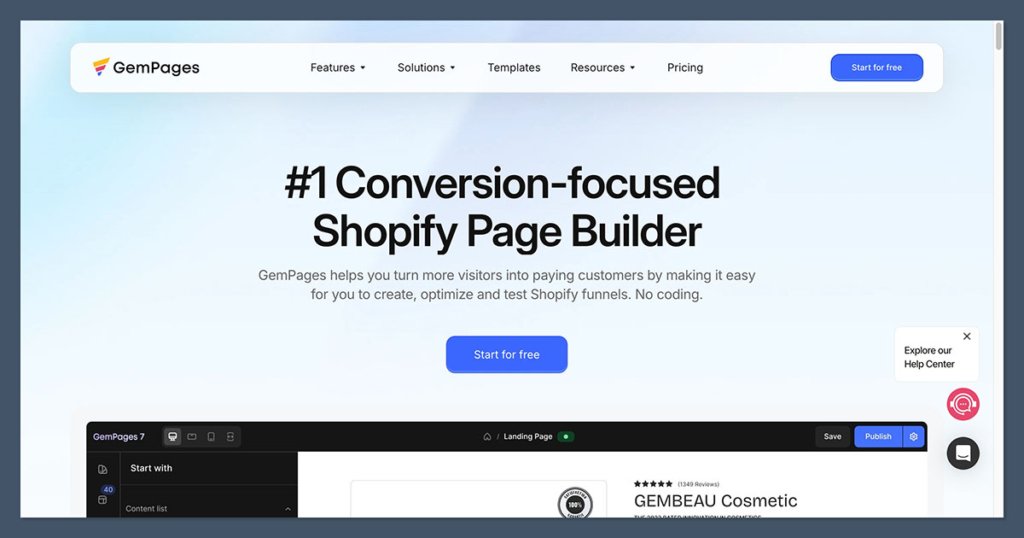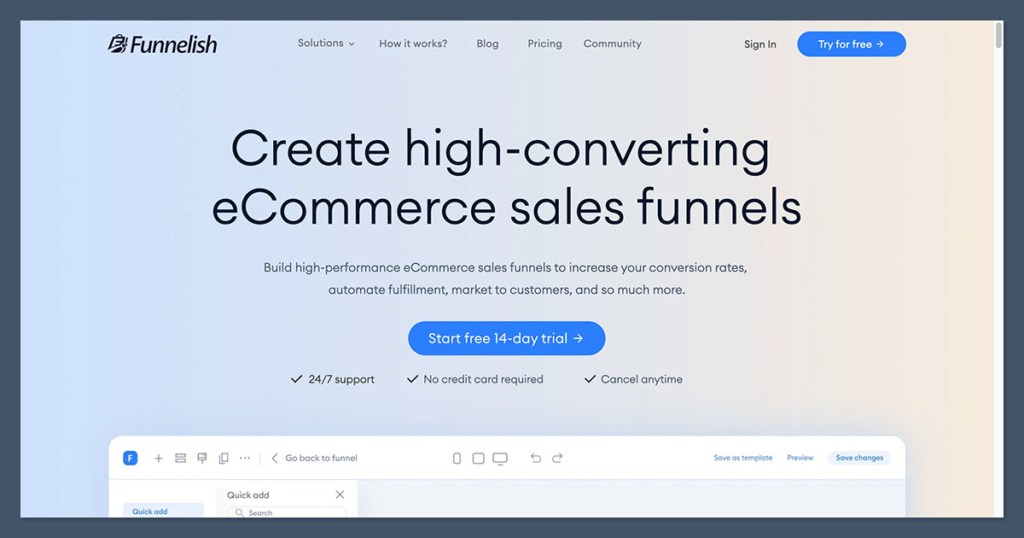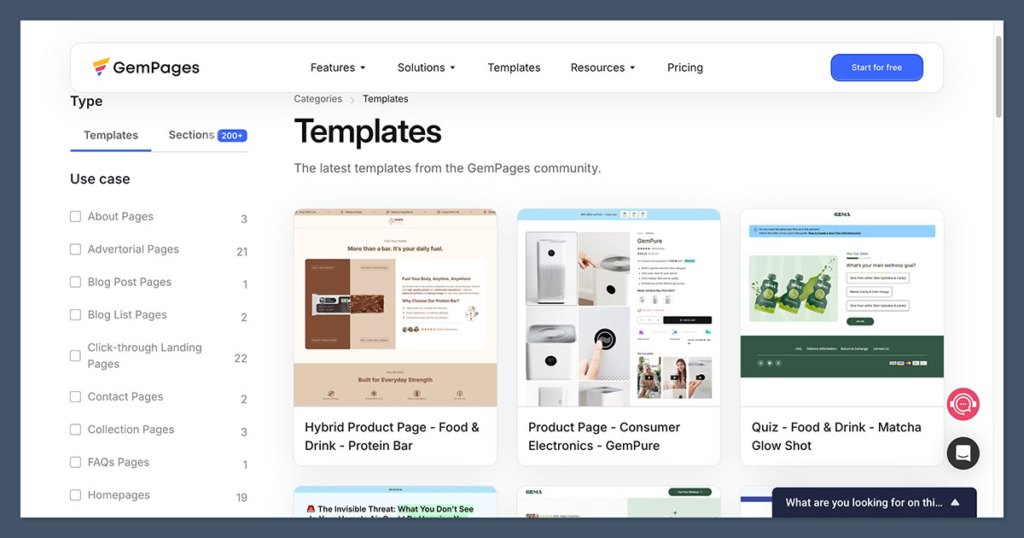
Funnelish and GemPages are two popular tools for ecommerce store owners — but which one should you choose?
We spent over 150 hours researching, comparing, and testing both platforms to bring you a clear recommendation.
From building beautiful Shopify pages to optimizing sales funnels, both tools offer strong features. But they serve very different purposes.
If you want more design control and brand customization, GemPages comes out ahead.
But if you’re running paid traffic and need to improve conversion rates, Funnelish is a better fit.
This guide compares both tools on pricing, design features, performance, ease of use, and more — to help you decide which one suits your store best.
Funnelish vs GemPages: Quick Verdict
GemPages – Best overall for ecommerce store design and branding flexibility
Funnelish – Best for one-product stores and conversion-focused sales funnels
If you want to build a high-converting sales funnel with minimal design distractions, choose Funnelish.
If you’re more focused on branded pages, content, and organic SEO, go with GemPages.
Quick Comparison: Funnelish vs GemPages
Get a side-by-side overview of how each tool compares:
| Category | Funnelish | GemPages |
|---|---|---|
| Best For | One-product funnels, AOV optimization | Custom Shopify page design |
| Editor Type | Form-based, no drag-and-drop | Full visual drag-and-drop |
| Shopify Integration | Deep | Deep |
| Sales Funnels | Yes, native | No, external apps needed |
| SEO Control | Limited | Strong |
| A/B Testing | Built-in | Not included |
| Page Speed | Fast-loading | Heavier pages possible |
| Starting Price | $49/month | $29/month |
| Templates | Funnel-specific | Storewide page types |
| Best For: | Paid ads, digital product sales | Organic traffic, brand building |
Pricing: GemPages Is More Flexible

Both tools use monthly pricing plans, but the cost structure is quite different — especially when you factor in features.
Funnelish Pricing (USD)
- Starter Plan – $49/month: One funnel, core features
- Pro Plan – $99/month: Unlimited funnels, A/B testing
- Custom Plan: For high-volume or enterprise brands
All Funnelish plans include checkout optimizations, upsells, and order bumps — without needing third-party apps.
GemPages Pricing (USD)
- Build – $29/month: Limited pages and features
- Optimize – $59/month: CRO elements, full-page access
- Enterprise – $199/month: Unlimited pages and priority support
GemPages is cheaper to get started, but if you need more than a few pages or want access to conversion tools, you’ll likely end up on the $59 or $199 plan.
The Winner: GemPages for flexibility, Funnelish for funnel value
GemPages is more affordable at the entry level, but Funnelish offers better value for stores focused on conversion and upsells.
Page Building & Design: GemPages Is the Clear Winner
Design flexibility is where GemPages shines. It’s a true visual builder that lets you customize every page of your Shopify store — from homepage to product to collection pages.
Funnelish, on the other hand, is built for funnel flows and product offers — not brand storytelling.
Funnelish
- Templates are clean and conversion-optimized, but not deeply customizable
- Focused on upsells, order bumps, and product offers
- Pages are functional and fast-loading, but limited in branding control
This makes Funnelish ideal for direct-response ecommerce stores that prioritize performance over aesthetics.
If your goal is to quickly move a visitor from click to checkout, Funnelish keeps the journey simple and distraction-free.
GemPages
- Full visual editor with drag-and-drop elements
- Customize every page — including non-product pages
- Dozens of CRO-friendly elements: countdown timers, badges, tabs, testimonials
- Build unique mobile layouts separately from desktop views
This gives GemPages a clear advantage for brands that want complete design freedom and a polished storefront experience.
It’s especially useful for stores that rely on storytelling, visual content, and consistent branding across all pages.
The Winner: GemPages
If you care about your store’s design, GemPages is the better choice. You’ll have full control over layout, content blocks, fonts, spacing, and visuals.
Funnel Features: Funnelish Is Built for Conversions

This is where Funnelish stands out — it’s designed to help you build a sales funnel that actually makes money, especially if you’re running Facebook or TikTok ads.
Funnelish Funnel Capabilities
- One-click upsells and downsells
- Order bumps at checkout
- A/B testing built-in
- Native integration with Shopify
- Auto-add customer data to email flows
You can build a complete sales journey from landing page to checkout to post-purchase offers, all inside Funnelish.
GemPages Limitations
- No built-in funnel logic
- You can build landing pages, but upsells or post-purchase offers need third-party tools
- No native A/B testing
These limitations can slow down growth for stores focused on maximizing revenue per visitor. Without native funnel tools, you’ll need to rely on external apps and more manual setup to replicate a true sales funnel.
The Winner: Funnelish
For stores running paid ads or selling one product, Funnelish will likely make you more money per visitor through funnel optimization.
SEO and Organic Growth: GemPages Is More SEO-Friendly
If you’re relying on content, blogs, or organic traffic — SEO is critical. GemPages includes native SEO tools, while Funnelish is focused more on conversion than discoverability.
SEO Features in GemPages
- Customize meta titles, descriptions, and schema
- Set alt tags for all images
- Integrates with tools like Yoast and Semrush
- Pages are structured with SEO best practices in mind
These features make GemPages a strong choice for stores focused on long-term organic growth. It gives you the tools to build pages that not only look good but also rank well in search engines.
Funnelish SEO Drawbacks
- Basic meta fields
- No schema markup tools
- Pages are fast, but not deeply optimized for search
While speed helps with basic SEO performance, the lack of deeper optimization tools makes it less effective for content-driven or search-focused strategies. It’s better suited for paid traffic than for attracting organic visitors.
The Winner: GemPages
GemPages gives you full control over on-page SEO and helps you build content that can rank in Google. Funnelish is built for PPC, not content marketing.
App Integrations & Ecosystem
Both tools integrate with Shopify, but they take different approaches to add-ons and external tools.
Funnelish
- Integrates with Shopify, Stripe, Klaviyo, Google Analytics, Facebook Pixel
- Very focused toolset — built-in features for upsells and CRO
- Fewer integrations overall
This streamlined setup works well if you’re focused on speed and simplicity, without the need for a complex tech stack. However, it may feel limiting for stores that rely heavily on broader app ecosystems or advanced marketing tools.
GemPages
- Integrates with over 100 popular Shopify apps
- Seamless connection to review tools like Loox and Judge.me
- Compatible with page-level analytics, email marketing platforms, and third-party A/B testing tools
Its wide range of integrations makes it a better fit for growing stores that want flexibility and scalability. You can easily connect the tools you already use without compromising on functionality or design.
The Winner: GemPages
For broader store-building needs, GemPages offers a larger integration ecosystem. It’s better suited for stores looking to scale through third-party apps.
Performance: Funnelish Is Faster by Default
Speed affects both SEO and conversions. Funnelish is known for lightweight, fast-loading pages — particularly important for mobile users.
Funnelish
- Focused page structure for speed
- Less bloat = faster load times
- Optimized for mobile and checkout experiences
This makes it a strong option for stores where speed directly impacts conversion, especially on mobile. The streamlined page setup reduces friction at every step of the funnel.
GemPages
- Heavier custom pages can load slower if not optimized
- Multiple design elements and custom code can affect speed
- You’ll need to compress images and minimize scripts manually
With more design freedom comes more responsibility — performance depends heavily on how well your pages are built and optimized. For best results, you’ll need to actively manage assets and keep layouts lightweight.
The Winner: Funnelish
If speed is your top priority, Funnelish pages are leaner and quicker out of the box — especially important if you run a high-volume store or send lots of paid traffic.
Ease of Use: GemPages Is More Beginner-Friendly
If you’re not technical, the learning curve matters.
Funnelish Usability
- Built more for marketers than designers
- Somewhat steep learning curve to build your first funnel
- UI isn’t as intuitive as Shopify’s native editor
It’s best suited for users who understand funnel strategy and don’t mind a more technical setup process. If you’re new to ecommerce tools, expect a bit of a learning curve before you feel comfortable.
GemPages Usability
- Drag-and-drop makes it easy to use, even for beginners
- No coding required for most changes
- Page templates help speed up setup
Its intuitive interface makes it accessible for users of all skill levels, from beginners to experienced store owners. You can launch professional-looking pages quickly without needing design or coding knowledge.
The Winner: GemPages
GemPages is easier to use from day one. Funnelish takes a bit more effort to learn, especially if you’ve never built funnels before.
Templates and Layouts

Both platforms offer templates, but with different use cases.
Funnelish Templates
- Focused on single-product sales
- Simple, mobile-optimized layouts
- Designed for fast launches and A/B tests
These templates are ideal for lean, high-performing funnels where speed and simplicity matter more than branding. They’re built to get offers live quickly and start testing without extra design work.
GemPages Templates
- Dozens of templates across industries
- Homepage, product, collection, and landing page layouts
- Customizable and conversion-optimized
The variety and flexibility make it easy to build a fully branded store that feels cohesive across every touchpoint. Whether you’re launching a campaign or building your main storefront, there’s a template to match your needs.
The Winner: GemPages
GemPages has more template variety and flexibility. Funnelish templates are solid for sales-focused flows but limited for brand storytelling.
Final Recommendation: Which Should You Choose?
Choose Funnelish If…
- You’re selling 1–3 products
- You’re running paid ads and want to improve ROAS
- You need one-click upsells, A/B testing, and checkout customization
- You’re focused on conversion rates more than design flexibility
Choose GemPages If…
- You run a multi-product store
- You care about branding, SEO, and design
- You want more control over the look and layout of your store
- You need to build product, collection, and landing pages easily
Conclusion: Funnelish vs GemPages
If your priority is maximizing sales from every visitor — go with Funnelish. It’s a focused tool that helps you build funnels fast, and optimize them for more revenue.
But if you care more about how your store looks, performs in search, and connects with customers through branded design, GemPages is the better choice.
Try both — Funnelish offers a free trial, and GemPages lets you build pages before upgrading. See which one fits your workflow, business model, and growth goals.



